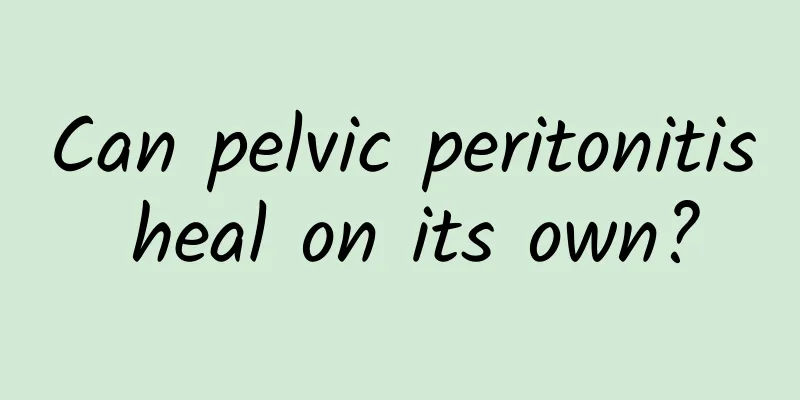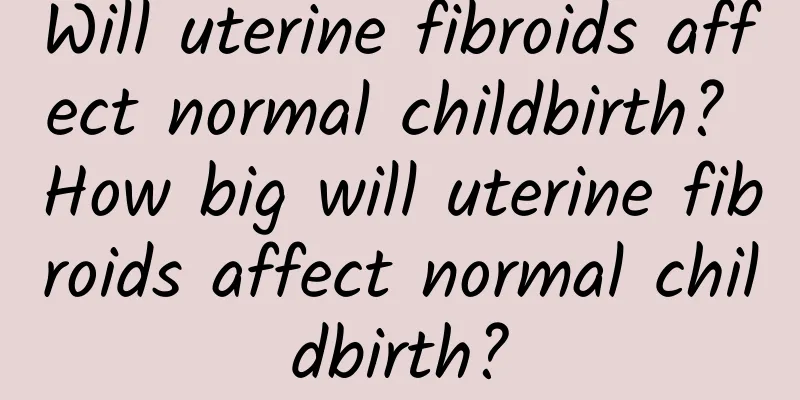Can pelvic peritonitis heal on its own?

|
Is there any basis for the theory that pelvic peritonitis can heal itself? Although pelvic peritonitis is a minor inflammation, it must be treated promptly after discovery. However, many women who suffer from pelvic peritonitis take chances and hope that the inflammation will heal itself without treatment. So is there any basis for saying this? Gynecological experts say that there is no basis for the theory that pelvic peritonitis can heal itself. If pelvic peritonitis is not treated promptly, it can lead to infertility or other complications. Therefore, women are advised to actively seek treatment after being diagnosed with pelvic peritonitis. Pelvic peritonitis is very dangerous and must be treated promptly 1. Can cause female infertility The onset of gynecological disease pelvic peritonitis is usually a mixed infection caused by more than one pathogen. The inflammation of the reproductive organs and surrounding tissues is often not isolated, but affects each other. If the fallopian tubes are also affected by inflammation of pelvic peritonitis, it will cause adhesions and complete blockage of the lumen, which may affect future pregnancy and cause infertility. If the inflammation is limited to the pelvic connective tissue and the fallopian tubes are not affected, it will not affect the reproductive function. 2. Can cause ectopic pregnancy in women Chronic pelvic peritonitis recurs over time, causing pelvic congestion, connective tissue fibrosis, and adhesion of pelvic organs. If the inflammation does not heal for a long time, it can cause adhesion of the mucosa in the fallopian tube, block the fallopian tube, or incomplete blockage of the fallopian tube lumen, increasing the chance of ectopic pregnancy. At the same time, inflammation can make the fallopian tube less smooth, and the young fertilized eggs are unable to cope with it, so they have to make do with the situation and form an ectopic pregnancy. Surgery can solve the adhesion of the inflammation itself, and hydrotubation can restore the function of the fallopian tube. But even with this treatment, ectopic pregnancy cannot be completely eliminated, and many people will still have ectopic pregnancy again. 3. Can cause diffuse peritonitis The development and spread of pelvic peritonitis can spread to the serosal layer of the outer layer of the uterus, which is the part that connects the uterus to other pelvic organs. Inflammation can lead to pelvic peritonitis. Continuing to develop and worsen will form diffuse pelvic peritonitis, with symptoms of systemic poisoning, such as high fever, nausea, vomiting, and abdominal distension. Because the inflammatory exudation and cellulose coverage of the peritoneal surface can cause intestinal adhesions and abscesses, untimely treatment in the acute phase can develop into chronic pelvic peritonitis, leading to infertility. At the same time, repeated attacks of inflammation can also have serious psychological and physiological effects on patients. Negative emotions such as anxiety, irritability, depression, and fear will aggravate physical discomfort, and sexual indifference and sexual aversion will affect the relationship between husband and wife. What are the principles of treatment for pelvic peritonitis? Antibiotics are the main treatment for infection, and surgery is performed when necessary. Broad-spectrum antibiotics are selected based on experience to cover possible pathogens, including Neisseria gonorrhoeae, Chlamydia trachomatis, Mycoplasma, anaerobic bacteria, and aerobic bacteria. (1) All treatment regimens must be effective against Neisseria gonorrhoeae and Chlamydia trachomatis, because negative endometrial and cervical screening findings do not exclude upper genital tract infection. (2) The antimicrobial spectrum of the currently recommended treatment regimen should cover anaerobic bacteria. (3) Start treatment immediately, because timely and appropriate use of antibiotics is directly related to long-term prognosis. (4) When choosing a treatment plan, factors such as effectiveness, cost, patient compliance, and drug sensitivity should be considered comprehensively. (5) Method of administration: Intravenous and non-intravenous administration and the need for hospitalization are determined by the physician's discretion. (6) Traditional Chinese medicine treatment can also have a certain effect on pelvic peritonitis. The above is an introduction to how pelvic peritonitis can heal itself. I hope it will be helpful to you. |
<<: How long does it take to cure pelvic peritonitis?
>>: Is pelvic peritonitis difficult to cure?
Recommend
The harm of cervicitis to female patients
I believe most women are familiar with the sympto...
Is ectopic pregnancy hereditary?
Can ectopic pregnancy be inherited? The onset of ...
What is the treatment method for painless abortion?
What is the treatment method for painless abortio...
High oil and high sugar levels cause obesity, and 3 types of body types can be distinguished! Chinese medicine practitioner: Eating winter melon porridge can help people with this body type lose weight
In order to lose weight quickly, many people seek...
What are the symptoms of bacterial vaginosis
Symptoms of bacterial vaginosis include increased...
How long to rest after three months of miscarriage
Generally speaking, it is recommended to rest for...
Follow-up care after surgery for congenital absence of vagina
Congenital absence of vagina not only threatens o...
Can I get pregnant with adenomyosis?
Adenomyosis is a very common female disease, and ...
An ugly complexion may indicate gynecological disease
It is women's nature to love beauty, but a ha...
What medicine is used for intrauterine adhesions
What medicine is used for intrauterine adhesions?...
Can I use a pregnancy test stick to detect an ectopic pregnancy?
Pregnancy test sticks are a common pregnancy test...
How can we effectively prevent the recurrence of uterine fibroids?
It is very common for uterine fibroids to recur a...
Combination of Chinese and Western medicine in treating pelvic peritonitis
There are more and more gynecological diseases in...
Are you using the right method to lose weight during the menstrual cycle? Chinese medicine practitioner Luo Peilin revealed: "This time" after menstruation is the most effective
Smart women know how to use their menstrual cycle...
Coach, I want to become stronger, what nutrients should I supplement?
If the human body is compared to a machine, then ...









